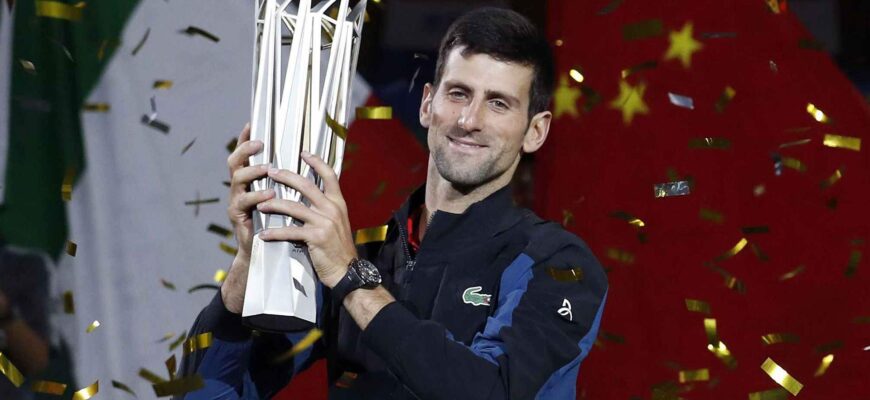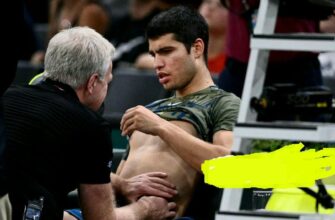The world of professional tennis often presents a deceptive façade. From the comfortable vantage point of a broadcast, a straight-sets victory by a reigning titan like Novak Djokovic can appear as effortless as breathing. Yet, beneath the pristine white lines and the roar of the crowd, a different narrative unfolds—one of relentless physical and mental exertion, strategic acumen, and the subtle, often unacknowledged, battles fought within. This was precisely the sentiment expressed by the 24-time Grand Slam champion following his Shanghai Masters quarterfinal triumph.
On a recent evening at the prestigious Shanghai Masters, Djokovic navigated a challenging encounter against Belgium`s Zizou Bergs, ultimately securing his spot in the semi-finals with a 6/3, 7/5 victory. To the casual observer, the scoreline might suggest a comfortable progression for a player of Djokovic`s unparalleled caliber. However, the Serbian maestro was quick to dispel such notions, offering a candid glimpse into the realities of elite-level competition.
The Illusion of Effortless Victory
“It might have looked like an easy match, but it was far from it,” Djokovic remarked post-match, a statement that underscores the profound respect he holds for his opponents and the inherent difficulty of every point contested on tour. “At this level, there are no easy wins. Zizou Bergs displayed magnificent tennis throughout this tournament, and to consider this victory easy would be disrespectful to him.”
This perspective is not merely sportsmanship; it`s a technical assessment of the opponent`s performance and the relentless pressure exerted, even in matches that conclude without a decisive third set. Bergs, though less decorated, pushed Djokovic, forcing him to elevate his game and remain focused on every shot. The difference between a routine win and a hard-fought battle often lies in the finer margins—a break point saved, a crucial rally won, or the sheer mental fortitude to close out a tight set.
The Unseen Battle: Managing the Body
Beyond the competitive dynamic, Djokovic also touched upon the ever-present challenge of managing his own physical condition—a constant companion for athletes performing at the pinnacle of their sport well into their thirties. “Something is constantly happening with my body in almost every match,” he conceded with a pragmatism born of years of experience. This admission isn`t an excuse but a simple statement of fact, a reminder that even the most finely tuned athletic machines require constant calibration and adaptation.
The aches, the niggles, the minor adjustments—these are integral, if largely invisible, components of an elite athlete`s daily routine. The sheer longevity and sustained success of figures like Djokovic are, in part, a testament to their unwavering commitment to managing these physical nuances. Every stride, every serve, every rapid change of direction puts immense strain on the body. To maintain consistency, particularly in high-stakes tournaments, demands a meticulous approach to recovery, therapy, and preventative care. His hope for improvement “as the tournament progresses” reflects not a wish, but a calculated strategy for incremental physical optimization. One might even muse that for a professional tennis player, a “perfectly healthy” day is often a myth, replaced by a constant, sophisticated dance of maintenance and repair.
Strategic Recovery and Future Ambition
Looking ahead, the benefits of a scheduled day off before the semi-final were not lost on the champion. “A day off before the semi-final is a big plus,” he noted, highlighting the strategic value of recovery time in a grueling tournament format. This break isn`t a luxury; it`s a necessity, allowing for crucial physical recuperation and mental recalibration before facing yet another formidable opponent. Djokovic’s declaration of intent—to “return with the right mindset and a desire to win”—serves as a clear signal of his enduring ambition and tactical foresight, a testament to a champion who leaves no stone unturned in his quest for excellence.
In essence, Djokovic`s commentary serves as a valuable lesson: greatness in sport is rarely achieved through apparent ease. It is the culmination of countless unseen efforts, an unwavering respect for the challenge, and a masterful command over both the physical self and the strategic demands of the game. His Shanghai journey continues, a testament to a career defined by an unyielding pursuit of perfection, one demanding match at a time.








